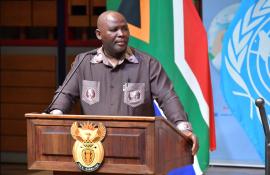
While it will take some time to get used to the idea of a coalition government, coalitions are here to stay, says Chairperson of the Public Service Commission (PSC), Professor Somadoda Fikeni, as he unpacks the different dimensions that coalitions bring.
“It is not a passing phase but something we must be prepared for and navigate,” he says.
Fikeni was speaking during a webinar hosted by the National School of Government (NSG) under the topic: “Making Coalitions and Governments of National Unity Work: The Role of Professional Bureaucracies.”
The webinar provided a platform to discuss the likely impact of the Government of National Unity (GNU) on the public administration and governance system, with lessons from countries abroad that have gone through power sharing arrangements, as well as in the country’s local government system where coalitions have also been in existence for a few years.
READ | Trust and relationships key ingredients to coalition governments
Psychology
In his remarks, Fikeni highlighted a need for spending enough time reflecting on the political psychology of the public service and coalition politics, including rational choices and what informs them in the process of their interface.
He said coalition governments need to invest more on political psychology, because “it is not just a legislation, but a behavioral pattern, a perception and misperception, trust and mistrust.
“It is in this realm that I think that even training institutions [including] academic institutions invest more into [the] space of soft skills; how to deal with diversity; how to anticipate conflict situations, [and] how to deal with trust and [the] building of trust.
“Those are in the psychological realm. They are not sometimes written in any particular space, and that in itself I think, is the space even social scientists and law studying departments in the public sector do not spend much time dealing [with] in those particular areas,” he explained.
In a toxic environment or in spaces of certain kinds of personalities, Fikeni said: “If you have a strong personality Minister and strong personality DG (Director-General), and all of them are there to prove a point, you are almost certain that you would have a clash down the line [and] that profiling of behavioral patterns becomes very much important, not only for the DG, but for the DDGs [Deputy Director-Generals], Chief Directors and so forth.”
Language and tension
Fikeni also underscored the importance of issues of editing the language in a professional space, noting that some principals are used to greeting and talking to each other with phrases such as ‘‘Hi comrade; Hi chief.”
“Now you are going to deal with the Minister from a different world of politics where such may signal something different. How do you deal with those particular spaces, and how do we deal with the issue of political culture and unlearning certain things that we have learned in order to relearn new things,” Fikeni said.
While some or most people think that with coalition politics, things might be bad and tensions might be high, as it brings together people from different political backgrounds, Fikeni believes this may not be the case, noting that the new leaders from the various political parties may be anxious.
“They know that they might be moving into a hostile space, and they might exercise more caution and try to get more allies, and more understanding than we may actually give them credit for,” the Chairperson said.
Fikeni also reiterated the sentiments that chief advisors of different plans from different political parties need to be given support and access to centres of excellence.
“There might be a need to target those people in the private offices, like Chief of Staff, advisors and so forth, for a training [so that] they are also taken into the same space for this professionalism and professionalisation, and go beyond just looking at the principals of a political party they are bringing; something larger in terms of the agenda and the priorities of the seventh administration - but also the national interest," Fikeni said.– SAnews.gov.za


